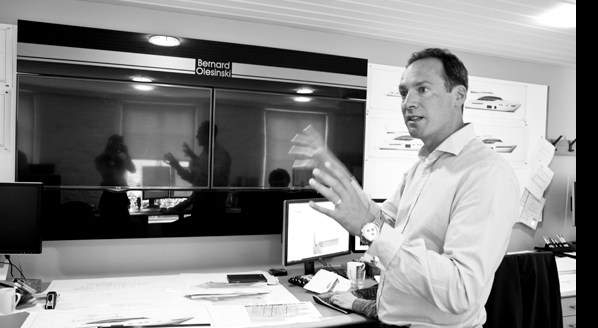Designers: Land vs Sea
How do residential design projects differ from yacht projects? A panel of designers discuss…

How do yacht projects differ from their land-based counterparts? This was the question asked on day two at The Superyacht Design Forum, held last week at Design Centre, Chelsea Harbour. Selina McCabe, Winch Design, designer Evan K Marshall; James White, March & White and Karen Howes, Taylor Howes formed the panel of speakers with experience in both residential and yacht designs.
White talked the audience through the studio’s projects, explaining how they brought the “luxury of yachting” into residential. “The lines are blurring, in a good way,” agreed Howes, citing many hotels that now look like luxury apartments, and how yachts use many elements of residential design, such as large windows and subtle lighting. Discussing the luxurious nature of yachting interiors that is prevalent in the industry, McCabe argued that when it comes to yacht projects, many clients will be a little more extravagant in their designs. “There is still that element of going somewhere that feels special,” she explained, whereas a residential project – although very high quality – may feature more home comforts. Marshall agreed, arguing that “something that should always remain special about a yacht interior.” The client may have many homes across the world, but normally only one yacht.
“What I love about architectural projects is the sense of place that you get, which you really need to consider,” said McCabe, as she talked the audience through a project that featured a floor-to-ceiling glass window overlooking the South African coast. “The challenge was to embrace an environment that could have wild storms in the winter and glaring sunshine in the summer.” The location of the project is often the driving force behind unique characteristics of the design, as White explains, “With a yacht design, you start with the owner... with architectural projects, you start with the location.”
“With a yacht design, you start with the owner... with architectural projects you start with the location.”
The panel discussed the difference between residential and yacht projects when it comes to housing art collections. Howes argued that many residential projects often start with art at the forefront of the client’s mind, whereas arts for yachts is either commissioned later or not considered until the final stages of the yacht build. She also added that it is more common for art collections on board to fall out of fashion at a faster rate, due to the complicated processes needed to remove and replace art on yachts.
The length of yacht projects often means that the designs can change substantially from the initial sketches to the final outcome. Residential projects are typically take less than two years, whereas yacht designs can be anywhere up to five years. In this time, designs, preferences and inspirations can alter significantly. McCabe highlighted the strong relationships that can be formed in the duration of a yacht project, as you develop a close association with the client who you are working with. For Marshall, the period of getting to know the client is something that he enjoys the most. “The fun part of our job is to listen to our clients and then deliver it to them.” Interestingly, all the designers have noticed more and more clients using digital platforms when sourcing inspiration. Clients use tools such as Pinterest and Instagram to discover the latest trends and products that they wish to include in their residence or yacht.
Why are superyacht interiors more expensive than their residential counterparts, and is this price hike justifiable? Each designer agreed that quality, materials and effort needed for space-saving on board yachts, usually drives up the price. In some cases, it’s also expected; as Marshall explained, “Generally, you can justify spending more for a yacht project.” McCabe also highlighted that the majority of furniture and pieces found on board a yacht are bespoke, whereas with residential projects, there is often a mix between individual (and thus more expensive) pieces and those that have been bought directly from a designer or shop.
When it comes to the future for yacht design, McCabe argued that what has previously been established as ‘yacht design’ is changing. “We are starting to challenge what a yacht interior is,” she said. “We’re stripping it back.” The panel acknowledged that the recent trend of “a barefoot, contemporary feel” in yachting, with more minimal touches, is becoming very prevalent.
The relationship with between a designer and client is one that, once formed, can continue for decades. The complementary relationship between yacht design and high-end residential design means that often clients will use the same designer for these two elements of their lives. It is only natural then, that the two spheres of design will continue to influence each other.
Profile links
NEW: Sign up for SuperyachtNewsweek!
Get the latest weekly news, in-depth reports, intelligence, and strategic insights, delivered directly from The Superyacht Group's editors and market analysts.
Stay at the forefront of the superyacht industry with SuperyachtNewsweek
Click here to become part of The Superyacht Group community, and join us in our mission to make this industry accessible to all, and prosperous for the long-term. We are offering access to the superyacht industry’s most comprehensive and longstanding archive of business-critical information, as well as a comprehensive, real-time superyacht fleet database, for just £10 per month, because we are One Industry with One Mission. Sign up here.
Related news

Demanding times for design
What are the changes in superyacht design spheres, and is today's world of superyacht design very different to what it used to be?
Fleet
Related news
Demanding times for design
8 years ago
NEW: Sign up for
SuperyachtNewsweek!
Get the latest weekly news, in-depth reports, intelligence, and strategic insights, delivered directly from The Superyacht Group's editors and market analysts.
Stay at the forefront of the superyacht industry with SuperyachtNewsweek



